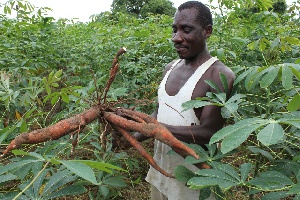Non-availability of ready markets for farmers to cart their produce during bumper harvests and rising cost of production have influenced many smallholder farmers in Brong Ahafo to drift away from the cultivation of hybrid seeds and other improved planting materials as they revert to indigenous breeds.
The farmers -- mostly root and tuber as well as maize cultivators -- say notwithstanding the high-yield production rate of hybrid and improved seeds, there are no corresponding markets to sell their produce after harvesting. According to them, it is also relatively capital intensive to plant modern breeds as compared to the traditional ones, hence their decision to shun them so as to reduce cost.
“It is not economically prudent for smallholder farmers as we are to the purchase hybrids at an expensive price when there no ready markets to sell our harvest. We are grappling with high cost of farm labour and agrochemicals, and can’t continue to patronize hybrids when we have to sell on the open market where the buyers have monopolised bargaining power,” farmers told B&FT in an interview.
The farmers said the Ministry of Food and Agriculture and its allied partners have over the years “given too much premium to introduction of new materials and technologies geared toward increasing production, but have done very little in the area of conjuring sustainable and practical marketing plans” to deal with the perennial post-harvest losses which continue to ruin farmers.
They also claimed new cassava varieties such as ‘bankyehemaa and nkabom’ have high starch content and are not suitable for domestic consumption like preparation of ‘fufu’, and thus it’s not business-wise to continue planting them when their main buyers are the commercial fufu-sellers, also known as ‘chop-bar operators’.
Maize farmers on the other hand indicated that the buyers have high preference for the local variety, thus manipulating their choice of cultivation.
The Sunyani West district is one of the cassava growing hubs in Brong Ahafo, thanks to the successful implementation of interventional programmes such as the West Africa Agriculture Productivity Programme (WAAPP) and the Root and Tuber Improvement and Marketing Programme (RTIMP) being jointly sponsored by the International Fund for Agricultural Development (IFAD) and the Government of Ghana (GoG).
Irrespective of the increasing level of cassava production by the farmers there, their economic situation has not seen any significant improvement. The few Gari Processing Plants have been consuming a small proportion of the total cassava produced.
The processing plants have not shown any sign of increasing their production capacities -- citing bumpy operational challenges, especially high production cost, as a major bane of their activities.
Last year, Guinness Ghana Breweries Ltd. (GGBL) selected Sunyani-West as one of the designated areas in the country for mass collection of cassava tubers for the production of its new home-grown Ruut Extra Premium Beer but it appears the proposed agreement has hit a wall.
According to David Kpono, Sunyani West Block Farm/WAAPP Desk Officer, the falling agreement was the result of a price discrepancy between GGBL and the farmers. He said the farmers were hesitant to sell their cassava produce at industrial price to GGBL, adding: “They could have reached a consensus if GGBL had involved MOFA officials in the negotiations”.
Mr. Kpono advocated holistic support for community-based gari processing centres to revamp their operations in order to create a reliable market for cassava farmers. He also advised farmers to adhere to new and scientific methods of farming and processing to reduce the enormity of post-harvest losses.
Business News of Monday, 4 August 2014
Source: B&FT













